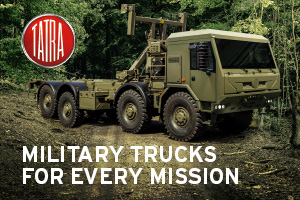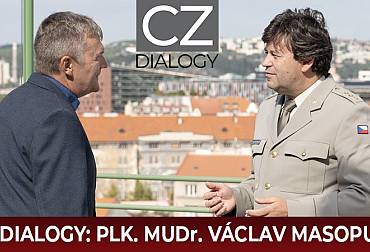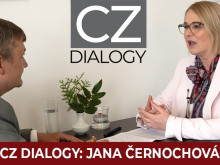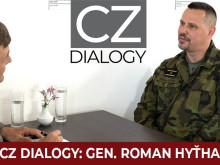Aleš Vytečka: Our cooperation with the Netherlands reaches hundreds of millions of euros
For the past two years, the Agency for Intergovernmental Defence Cooperation at the Ministry of Defence (AMOS) has been helping the domestic defence industry to broker deals with military material on an intergovernmental level. The agency's main goal is to strengthen bilateral relations with partner countries. Throughout its existence, AMOS has been headed by Aleš Vytečka, who worked for a number of years at the Ministry of Foreign Affairs, where he focused on trade in military material. He worked for the Czech Ministry in Ethiopia and Thailand, for example. Since our editorial team is interested in the activities and results of the AMOS agency, which has naturally been affected by the ongoing war in Ukraine, we have invited the director of the agency, Aleš Vytečka, to the next episode of our discussion programme CZ DIALOGY.
Video: Interview with Ales Vytečka, Director of AMOS / CZ DEFENCE
The war in Ukraine has had an impact on the agency's initial cooperation with Northern Macedonia. The initial cooperation project was put on hold and was not implemented until the end of last year. "The partners from Northern Macedonia approached us with the possibility of continuing the project on a government-to-government basis, again of course with the state enterprise LOM PRAHA. We are reflecting trends, adapting to the situation and I think it is very important that we are able to respond flexibly both primarily to the needs of the partner ministries of defence and to the international situation," says the director of AMOS. The establishment of AMOS was itself a response to a new trend in Europe. "Put simply, ten or fifteen years ago, out of ten projects, you had eight 'business to government' and two 'government to government'. Today it's say 5 to 5. And in two years, in five years, it will be 8 intergovernmental and 2 traditional. The reason is simple - the deteriorating international security situation in the world. Most countries are trying to do projects faster, more transparent and basically look for more guarantees in the form of support from the individual states that offer the instrument," says Ales Vytečka, adding that even at the time of the agency's establishment, one of the key elements was not to fall behind the trend and have a competitive disadvantage.
The establishment of the agency was also influenced by the experience of similar entities around the world, and so the question arises as to whom AMOS can compare itself with. Recently, two agencies have been mentioned in particular, namely Sweden's FMW, which is involved in the CV90 tracked BVP tender, and Israel's SIBAT. "For us, SIBAT is undoubtedly closer. Because we have very close relations with Israel, but it is also a country that is similar in size to us and has a strong defence industry. I do not want to compare, every industry is different and the Israeli one is certainly one of the largest and most developed in the world. But we are quite similar in type and character, and I think also in our approach to the problem," says Aleš Vytečka, who also adds that SIBAT is a mentor for AMOS: "We have even been there for consultations. There is no reason to invent something when there is already something within the existing agencies that works and makes the most sense from our point of view."
 Picture: In this episode of our discussion show CZ DIALOGY, we talked to the director of the AMOS agency Ales Vytečka | Michal Pivoňka / CZ DEFENCE
Picture: In this episode of our discussion show CZ DIALOGY, we talked to the director of the AMOS agency Ales Vytečka | Michal Pivoňka / CZ DEFENCE
AMOS's functioning has also been affected by the war in Ukraine, where its existing role has expanded. "We have a small team that focuses primarily on Ukraine. We were given this task mainly because we collect communications with foreign partners and communications within the government in the agency. But the most important thing was that we have a network of contacts towards our defence industry. This was used by the then Deputy Minister Tomáš Kopečný and myself to be prepared in case of an invasion. To be ready to react to it," revealed Aleš Vytečka. AMOS thus links our companies with the Ukrainian side in areas of urgent need. It communicates with foreign partners both in terms of coordinating what is urgently needed and within the format of the Ukraine Defense Contact Group (the Ukraine Defense Contact Group is an alliance of 54 countries supporting Ukraine's defense by sending military equipment in response to the Russian invasion in 2022, editor's note). It is also increasingly attempting to coordinate or communicate with foreign partners on the issue of seeking co-financing. "With the prolonged conflict in Ukraine, money is simply running out and Western partners have it. At that point, we need to reach out to these alliance partners that have funding and are raising arms for Ukraine and present our projects to them and ask if they want to co-fund. The best example is our cooperation with the Netherlands, which amounts to hundreds of millions of euros," says Aleš Vytečka.
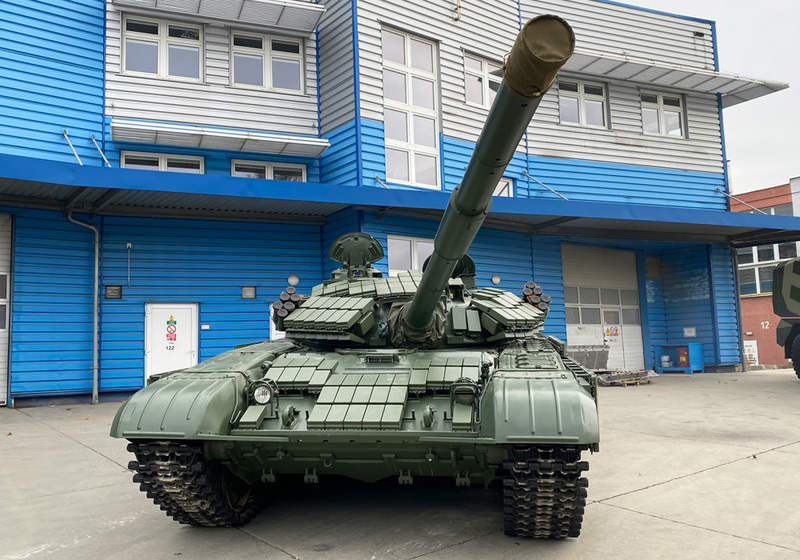 Picture: Dozens of US and Dutch-funded T-72EA tanks have already been sent to Ukraine by Excalibur Army | Michal Pivoňka / CZ DEFENCE
Picture: Dozens of US and Dutch-funded T-72EA tanks have already been sent to Ukraine by Excalibur Army | Michal Pivoňka / CZ DEFENCE
Of course, the agency's original brief remains. Among the government-to-government projects, we can mention, for example, cooperation with the Philippines or a very special business contact with Slovakia. "We have already participated in the tender for the delivery of eight Pandur wheeled combat vehicles and now, of course, we are trying very hard to promote from the level of the Prime Minister and the Minister the delivery of L-39 NG trainer aircraft and light fighters. Slovakia and the Czech Republic, of course, have a completely unprecedented and special relationship reaching a strategic level. This cooperation takes many forms, not only from the Czech Republic to Slovakia, but also in the other direction. We are building something very special. I would point out that Finland and Sweden, for example, have a similar special relationship. So we are not inventing something new, but we are drawing on a proven model. It makes sense for historical and geographical reasons," says AMOS director Aleš Vytečka. Another major project that has been implemented is the supply of small arms to Ghana. "The sense is not just purely economic, of course, but Ghana is south of the essentially crumbling security environment in the Sahel. The aim is both to help a democratic country in West Africa, which is one of the few holding its stability, and possibly to strengthen its stabilising role northwards into the Sahel," Vytečka explains.
AMOS is also tackling a project involving aircraft to Uruguay to take part in patrolling and fighting drug cartels that also use this southern route towards Africa and Europe to smuggle drugs. "It also makes sense to us because Uruguay is the most developed country in Latin America. So we work with a number of non-European countries. Within the European Union and NATO, we try to target primarily the countries of NATO's eastern wing in the Baltics. There will be Ukraine, of course, although it is not yet a member of the Alliance, and then Romania or Bulgaria. We are cooperating a lot with Greece, so it's actually the south-eastern and eastern wing and the north-eastern wing of NATO," says Ales Vytečka, director of the Defence Ministry's Agency for Intergovernmental Cooperation AMOS.
In our interview with Ales Vytečka, we touched on many other topics. For example, we talked about cooperation with the Czech arms industry, the sufficiency of our cooperation on the supply of various types of weapons and ammunition to Ukraine, and we also discussed how long this intense trend can last. We also touched on the issue of strategic raw materials, strategic enterprises and critical infrastructure in the Czech Republic. We also talked about how the Czech Republic is perceived by other countries in the framework of intergovernmental negotiations. If you want to learn more, listen to the full interview at the beginning of this article.



